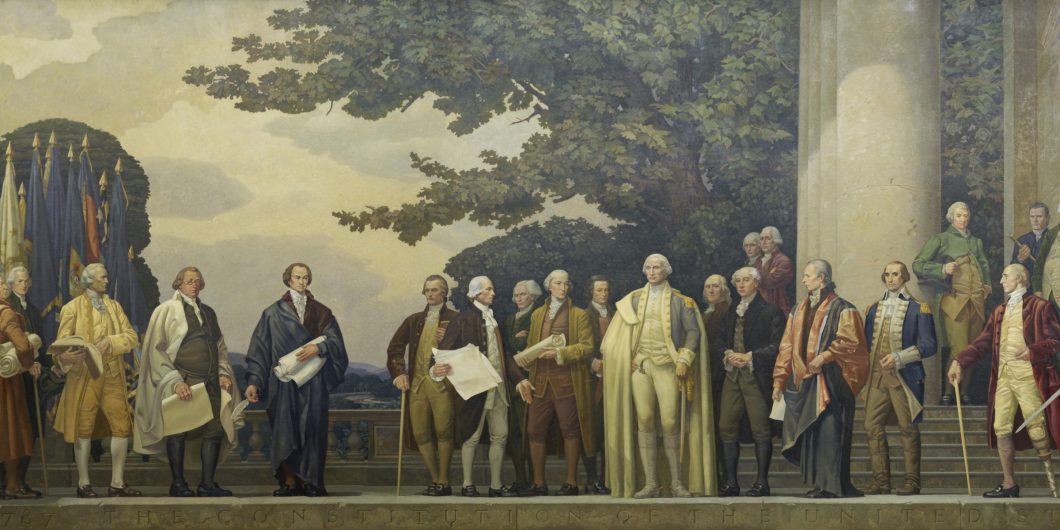Can Modern Originalism Save American Constitutionalism?
The politics of the modern West has been created by two very different revolutions—the American and the French. One of the important differences between the two is their conflicting concepts of a constitution. In his last book, Conservatism: An Invitation to the Great Tradition, the late great philosopher Sir Roger Scruton observed that the American Constitution, in its model for both structure and rights, “was designed to guarantee to the people what they had once enjoyed. It was the recipe for an already established practice rather than a recipe for a new order of things.” Scruton noted, for instance, that the rights provided in the American Constitution had been previously defined at common law. In contrast, the French Declaration of Rights was a product of philosophical reflection, an attempt “to transcribe into politics ideas that had previously no overt presence there and which owed . . . much to the abstract arguments of philosophers.”
The struggle over the interpretation of the United States Constitution is profitably understood as a debate over whether the United States should retain a constitution whose meaning was fixed by reference to established practices that animated the American Revolution or whether it should be changed into a constitution more closely resembling the French Declaration of Rights.
One of the distinctive features of living constitutionalism has been its abstraction of rights. Substantive due process, for instance, has on this view become a fount of undefined, fundamental rights. And what constitutes “fundamental” is a heavily philosophic question whose content is influenced by the intellectuals of the day.
To be sure, the Supreme Court justices have on occasion attempted to cabin the doctrine by appeal to established practice. For instance, according to Washington v. Glucksberg, the case rejecting a right to assisted suicide, substantive due process rights are only those that are “deeply rooted” in American traditions. But despite this verbiage, the Court has declared abortion and same-sex marriage to be fundamental rights. These rights are not “deeply rooted.” Like almost any practice, they might be considered a right derived from “liberty,” but only at an extremely high level of abstraction and only if that abstract liberty is given the appropriate ideological spin. As constitutional rights, they are modern inventions.
The modern originalist movement has the potential to restore the kind of constitution grounded in the American revolutionary experience. But its success depends on what version of originalism is employed. Some theories of originalism are very compatible with what Scruton identifies as the French version of constitutionalism. Jack Balkin, for instance, suggests that all that is binding on interpreters is the thin linguistic meaning of the Constitution, shorn of context, except as necessary to eliminate linguistic ambiguity. Thus, for Balkin, Article IV’s “domestic violence” cannot mean violence against a member of a household, but we are otherwise mostly free from original constitutional concepts. As a result, under Balkin’s originalism, rights in the Constitution become abstractions without roots in the concrete practices from the time they were enacted. They are given content in any era by social movements which generally move under some philosophical or ideological banner. It is a constitution that would be appreciated by the French revolutionaries.
But even the most mainstream academic theory of Originalism—the New Originalism—can tend in the direction against which Scruton warned. The New Originalism agrees that some parts of the Constitution have determinate meaning. But it accepts that other parts—perhaps major parts—are not clear and thus need to be constructed, not interpreted. That construction can include reading the enumerated rights at high levels of generality or purpose—so high that, again, they no longer reflect the established practice, but some grander philosophy. Using such methods, some modern originalists have found a right to same-sex marriage in the Constitution or discovered that the Fourteenth Amendment protects against sex discrimination (despite the absence of a clause in that Amendment recognizing such discrimination).
The Successor Ideology is not going to stay on campus but will soon be pushing for its ideas to be impressed in constitutional law.
Scruton’s dichotomy between the way the Anglo-American tradition and the French tradition conceive of and enforce constitutional rights and structures makes it easy to understand the growing disquiet of some conservatives with modern academic originalism. Nothing so unites traditional conservatives as horror of the French revolution and its methods! To the extent that modern originalism permits rights to become abstractions and the playthings of the modern equivalent of the French philosophes, it a method of interpretation that the heirs of Edmund Burke, the great critic of the French Revolution, must reject.
That is not to say these conservatives are necessarily apostles of the so-called “common-good” conservatism that Adrian Vermeule is pushing. They have imbibed enough of the skepticism of government—also an important part of the Anglo-American tradition—to be suspicious of cloaking the government with the power to do what it labels the common good.
Nor can the debate between the Anglo-American tradition and the French tradition be captured by the debate between judicial restraint and judicial engagement. Many conservatives have no objection to vigorously enforcing the textually defined rights in the Constitution as understood in the context of the specific practices. What they object to is making these rights into abstractions shorn of that context.
Some conservative critics of modern originalism are reactionaries, opposed to all change. But there is a method for fundamental constitutional change in the Constitution: the amendment process. It requires a continental consensus forged by legislators, both state and federal, elected by citizens. Conservatives are much more comfortable with such a socially rooted method of constitutional norm-production than that generated by nine justices, drawn largely from a narrow circle of the elite educational establishment.
The brand of originalism that best captures early America is Mike Rappaport’s and my original methods originalism. By stressing that the Constitution is a legal document with more precise meaning to words and phrases than given in ordinary speech and with legal methods for resolving ambiguity and vagueness, it offers a riposte to the abstractions that so concern conservatives. It is a “recipe,” to paraphrase Scruton, that grows out of “established practice.” It embeds the Constitution in the Anglo-American tradition and militates against the abstractions of the French philosophes. It ensures that constitutional change will come through slow and deliberate social reform of the kind celebrated by Burke and generated by our demanding amendment process.
The fundamental conflict between the traditions of constitutionalism that Scruton describes has never been more relevant than now, when a new band of anti-liberal philosophes is threatening to dominate our intellectual life. The new ideology on campus, sometimes called the Successor Ideology, is self-consciously post-liberal. It wants to replace the market meritocracy enabled by our amended Constitution of limited government and individual rights with an anti-capitalist identity politics. This social movement is not going to stay on campus but will soon be pushing for its ideas to be impressed in constitutional law. Interpreting the Constitution as a set of abstractions, as did the French revolutionaries and their American living constitutionalist successors, opens a channel for infusing this new ideology into our venerable charter of government. In contrast, originalism correctly conceived anchors the tradition of constitutionalism and provides the most effective protection against this latest enthusiasm of the intellectual class.


